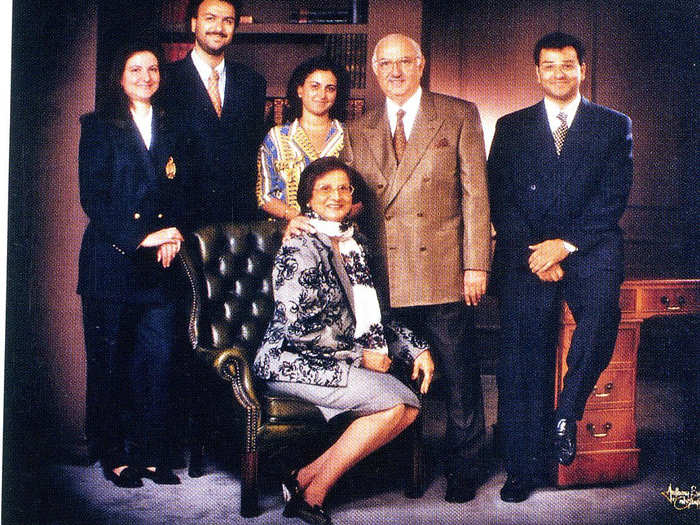
The Mistry family (Source: BCCL)
Mistry started out as the Managing Director of the Shapoorji Pallonji Group — an infrastructure conglomerate owned by his father, Pallonji Mistry. That was not the only thing that he handed over to his youngest son.
Mistry senior was also the largest shareholder in Tata Sons, granting him a seat on the boards of the company — a baton he passed onto Cyrus.
Though Cyrus Mistry has a strong educational background — a graduate of civil engineering from Imperial College of London and has a masters degree in management from the London Business School — many debate if it was his father’s credentials that did the trick.

Mistry, then deputy chairman of Tata Sons, with chairman Ratan Tata in 2011 (Source: BCCL)
In 2012, Cyrus Mistry was appointed as the chairman of Tata Sons. In addition to being at the head of the vast conglomerate, he was also CEO to Tata’s major subsidiaries — including Tata Steel, Tata Consultancy Services (TCS), Tata Motors, Indian Hotels, Tata Chemicals and others.
Half-Irish and half-Indian, Mistry was not just the sixth chairman of the group but also the second chairman who did not carry the Tata name, after Nowroji Saklatwala.
Till 2012, the unassuming Mistry was a relatively low-profile figure within India Inc circles, spending time with his wife Rohiqa, teenage sons - Firoz and Zahan - and his two dogs.

Mistry after being appointed chairman of Tata Sons (Source: BCCL)
For the shy and reticent Mistry, the $5 billion dip in Tata’s value from $108 billion in 2015 to $103 billion in 2016, was an unkind cut. The company’s net debt was also on the rise from $23.4 billion in 2015 to $24.5 billion in 2016 — the further the company had ever been in the red.
In addition, Mistry was going around making changes in leadership across the various companies under Tata Sons umbrella. He also put a new council in place that consisted of members new to the company, wanting it to play a bigger role within the group. He was also evolving the role of these companies — like making Tata Chemicals more focused on consumer foods and Tata Steel going from a ‘materials’ company to a steadfast steel company.
The top it off, his decision to sell Tata steel's UK plant didn’t go down well, creating panic among employees and the British government.
Come 24 October 2016, the board voted to remove him as chairman of Tata Sons.
Mistry after being ousted as chairman from Tata Sons (Source: BCCL)
The NCLAT’s decision to return the Tata Sons mantle to Mistry overturns the National Company Law Tribunal’s (NCLT) dismissal of earlier petitions by Cyrus Investments and Sterling Investments, which challenged his removal.
Mistry’s primary argument was that his removal as chairman violated the Companies Act — the only reason he was forced to leave was due to mismanagement of affairs across Tata Sons.
The NCLT, in turn, ruled that they could not find any evidence of mismanagement and the only reason he voted from power was because the board lost faith in him. They said that Mistry openly went against the board, and thus against the company as well.
See also:
Cyrus Mistry can return as Tata Sons Chairman three years after he was thrown out by Ratan Tata
First Cut: The legal implications of Mistry's victory in the case against Tata Sons
 Saudi Arabia wants China to help fund its struggling $500 billion Neom megaproject. Investors may not be too excited.
Saudi Arabia wants China to help fund its struggling $500 billion Neom megaproject. Investors may not be too excited. I spent $2,000 for 7 nights in a 179-square-foot room on one of the world's largest cruise ships. Take a look inside my cabin.
I spent $2,000 for 7 nights in a 179-square-foot room on one of the world's largest cruise ships. Take a look inside my cabin. One of the world's only 5-star airlines seems to be considering asking business-class passengers to bring their own cutlery
One of the world's only 5-star airlines seems to be considering asking business-class passengers to bring their own cutlery Experts warn of rising temperatures in Bengaluru as Phase 2 of Lok Sabha elections draws near
Experts warn of rising temperatures in Bengaluru as Phase 2 of Lok Sabha elections draws near
 Axis Bank posts net profit of ₹7,129 cr in March quarter
Axis Bank posts net profit of ₹7,129 cr in March quarter
 7 Best tourist places to visit in Rishikesh in 2024
7 Best tourist places to visit in Rishikesh in 2024

Copyright © 2024. Times Internet Limited. All rights reserved.For reprint rights. Times Syndication Service.